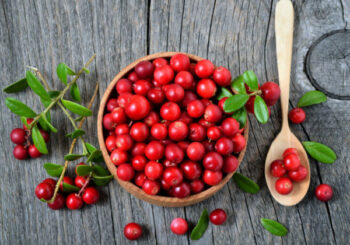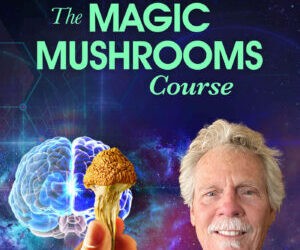 By Sayer Ji
By Sayer Ji
Contributing writer for Wake Up World
Lingonberries, also known as partridgeberries, redberries or Alaskan lowbush cranberries, grow on an evergreen shrub in northern climates. These berries contain important polyphenols — anthocyanins, resveratrol and quercetin — vitamins –A, C and E — micronutrients — iron and zinc — minerals — manganese, magnesium and potassium — free amino acids and omega-3 fatty acids.
Due to their antioxidant, anticancer, anti-inflammatory and immune-boosting properties, lingonberries are gaining notoriety as a health food.[i],[ii],[iii] Lingonberries’ most important benefits include fighting cancers, oxidative stress, obesity, metabolic disorders, heart, brain and liver diseases, infections and viruses as well as promoting health and longevity.
1. Fight Cancers
The most successful fractions of lingonberry leaves and fruits against cancer cell lines included proanthocyanidin and quercetin as examined through human in vitro studies of kidney, colon and malignant melanoma cancers.[iv]
Lingonberry extract inhibited the proliferation of liver cancer cells in a dose-dependent manner through in vitro study of human cancer and is believed to be a potential antitumor drug.[v]
Similarly, the effects of 10 different extracts of fruits and berries, including lingonberries, on cell proliferation of colon cancer cells and breast cancer cells in vitro showed significant decreases in both cancers’ growth in a concentration-dependent way.[vi]
A systematic review of 10 lingonberry and 21 bilberry in vitro studies suggested potent inhibition of colorectal cancer cell growth and tumor formation.[vii] Proanthocyanidins — particularly high in blueberries and lingonberries — showed the strongest ability to kill human colorectal cancer cells.[viii]
2. Mediate Oxidative Stress
In a plant study of lingonberry polyphenols, the anthocyanins and flavanols activated the nuclear factor erythroid 2-related factor 2 pathway, scavenged reactive oxygen species and inhibited cellular death — showing its ability to prevent and ameliorate oxidative stress and protect cells.[ix]
In a mice model, a 14-day dose of lingonberry extract prevented acute toxicity from gamma radiation and indicated that lingonberry anthocyanins have immunostimulatory potential against oxidative stress and radiation induced illnesses caused by exposure in medical testing, energy plants and other industries.[x]
In scientific examination of lingonberry compounds, the combination of anthocyanins and copigments possessed the highest antioxidant activities, but all polyphenol fractions protected cells from oxidative stress.[xi]
Through in vitro analysis, total phenolics and flavonoids in lingonberry extracts were slightly higher than those in blueberry extracts but blueberries bested lingonberry in anthocyanin content and antioxidant activity. Both berries were effective against oxidative-stress-related diseases such as cancer, heart, neurological and kidney diseases and arthritis.[xii],[xiii]
3. Protect Heart Health
In an experimental rat model of high blood pressure, long-term treatment with lingonberry juice lowered blood pressure and improved vascular function — two beneficial contributors to heart health — due to its anti-inflammatory properties.[xiv]
Eating lingonberries resulted in decreased triglyceride levels, improved gut microbiome and reduced atherosclerosis in a study of mice for eight weeks.[xv] Lingonberry anthocyanins protected cardiac cells from oxidative-stress-induced apoptosis as studied in vitro.[xvi]
Both lingonberry and blackberry leaves showed strong cardioprotective properties and significantly lowered low-density lipoprotein cholesterol levels associated with cardiovascular disease risk. Results were comparable to lovastatin, a cholesterol-lowering drug.[xvii]
In vitro research suggested that lingonberry’s antioxidant and anti-inflammatory properties may help prevent and treat obesity and corresponding inflammation which can lead to endothelial dysfunction–a coronary artery disease where arteries narrow and interrupt blood flow to the heart.[xviii]
4. Counteract Obesity
Dietary berry fruits — blueberries, cranberries, raspberries, strawberries, mulberries, lingonberries, blackberries, black chokeberries, elderberries, bilberries, grape, blackcurrants, jaboticabas, red bayberries, sea-buckthorns, goldenberries and goji berries — were found to counteract obesity or obesity-associated complications based on animal experiments and human studies.[xix]
Mice fed whole lingonberries showed fewer atherosclerotic plaques, while mice fed the lingonberry fiber fraction had the highest caecal butyric acid — an indicator of gut health. All groups fed lingonberry diets — fiber or berries — had improved plasma lipid profiles.[xx]
5. Prevent Diabetes
In an obese mouse model, mice ate a low-fat, high-fat or lingonberry-supplemented high-fat diet for six weeks. Lingonberries prevented the high-fat diet induced adverse changes in blood cholesterol and glucose levels and had a moderate effect on weight and visceral fat gain — demonstrating its obesity-fighting ability and prevention of comorbidities such as Type 2 diabetes.[xxi]
Mice fed a high-fat diet for eight weeks became obese and insulin-resistant and then were given three different lingonberry extract doses — 125, 250 and 500?milligrams per kilograms (mg/kg) — for eight weeks, which significantly decreased glycemia and insulin levels — Type 2 diabetes markers — in a dose-related way.[xxii]
6. Protect Your Brain
Forty healthy 50- to 70-year-olds drank a mixed berry beverage — 150 grams (g) blueberries, 50 g blackcurrant, 50 g elderberry, 50 g lingonberries, 50 g strawberry and 100 g tomatoes — or a control beverage with no fiber or polyphenols for five weeks.
The berry intervention reduced total and LDL cholesterol, lowered glucose and insulin concentrations and improved memory test performance compared to the baseline and control beverage. Berries showed preventive potential for Type 2 diabetes, cardiovascular disease and cognitive decline.[xxiii]
In a systematic review of blueberries and lingonberries in cell models of neurotoxicity and brain inflammation as well as in vivo models of neurodegenerative diseases, both berries combated reactive oxygen species and showed significant neuroprotective abilities and benefits for brain aging. Surprisingly, the leaves have a much higher antioxidant capacity than the fruits.[xxiv]
Lingonberry extract improved the cognition and memory of mice with cognitive impairment, induced by chronic uncertainty stress, by enhancing the antioxidative ability of tissues and improving the disorder of neurotransmitter levels caused by chronic stress.[xxv]
In an in vitro oxygen-glucose deprived injury rat model, lingonberry significantly protected the brain by suppressing the inflammatory biomarkers in primary neurons and modulating key proteins following hypoxic — when oxygen is lacking in the brain such as in a stroke — injury.[xxvi]
7. Improve the Liver and Kidney
In a high-fat diet-induced obese mouse model, lingonberry supplementation prevented adverse changes in the liver — involving inflammation, and glucose and lipid metabolism — that are known to predispose the development of anonalcoholic fatty liver disease (NAFLD) and its comorbidities.[xxvii]
Polyphenol extracts from arctic berries — lingonberry, alpine bearberry and especially cloudberry — targeted the gut-liver axis and protected against metabolic endotoxemia,[xxviii] insulin resistance and NAFLD in a diet-induced obese mice study.[xxix]
In a mouse model of high fat diet-induced NAFLD, lingonberries inhibited hepatic signaling and improved the liver lipid profile by regulating the expression of genes involved in hepatic lipid metabolism.[xxx]
Eating lingonberries for 12 weeks alleviated high fat diet-induced liver injury in a mouse model by preventing hepatic lipid accumulation, oxidative stress and inflammatory responses.[xxxi] In both animal and in vitro studies, lingonberry treatment demonstrated anti-liver fibrosis activities by increasing antioxidant enzymes.[xxxii]
Taking lingonberry for 12 weeks not only improved high-fat diet-induced renal inflammatory responses but also reduced kidney damage in a mouse model by regulating plasma lipid and glucose profiles and reducing plasma inflammatory cytokine levels.[xxxiii]
8. Regulate Insulin and Glucose
In a study of 20 healthy females consuming either white or rye bread, those who took the 150 g whole-berry purée of strawberries, bilberries, lingonberries and chokeberries had a significantly reduced insulin response.[xxxiv]
In comparison with taking sucrose alone in a study of 20 healthy women, ingestion of sucrose with lingonberries or blackcurrants resulted in reduced glucose and insulin concentrations, slower absorption of glucose and a significantly improved glycemic profile.[xxxv]
9. Prevent Infections and Viruses
Fermented lingonberry juice exerted a positive response in Candida glabrata — the second most common yeast infection — by expressing proteins related to oxidative stress and maintaining cell wall integrity in vitro.[xxxvi]
The extracts of all tested berry fruits, particularly bilberry, strawberry and lingonberry, strongly inhibited coxsackie virus — a marker of Type 1 diabetes — and flu viruses A and H3N2, confirming their antiviral properties.[xxxvii]
Because of the strong effect of lingonberry polyphenols found on oral microbial (viral) load reduction and consequent beneficial respiratory tract anti-inflammatory, antimicrobial and antiviral effects, scientists suggest further research on lingonberries to fight respiratory and coronavirus infections.[xxxviii]
In a comparison study of two berries, lingonberries contained more polyphenols than cranberries but both effectively decreased biofilm formation and oral streptococci activities to prevent dental caries (cavities).[xxxix]
10. Promote Longevity and Healthy Aging
Lingonberries — “superfruits” with the highest content of antioxidants among berries — promote a long life due to their anti-inflammatory, antioxidant, antiviral and anticancer effects.[xl]
Lingonberries both help prevent and treat brain aging and neurodegenerative disorders. In a study of 16,010 patients 70 and older, higher intake of flavonoids, particularly from berries, reduced rates of cognitive decline in older adults.[xli]
Eating lingonberries has a positive influence on healthy aging and promotes longevity.[xlii] Lingonberry seed oil on the skin reduced age spots and eating lingonberries can help fight aging due to their potent vitamin, mineral and polyphenol content.[xliii]
In a study of 99 healthy female subjects taking either a low-dose mix of lingonberry (25 mg) and amla (30 mg) fruit extracts, a double dose of both extracts or a control drink for 12 weeks, significant dose-dependent improvements from the fruit drink in skin elasticity, thickness and hydration as well as the degree of wrinkles showed its antiaging effectiveness.[xliv]
Lingonberries as a Superfood
Why are lingonberries so effective in keeping you healthy? These super berries fight inflammation, which is a key factor in serious illnesses such as cardiovascular disease, cancer, neurological diseases, obesity, diabetes and infectious diseases.[xlv] To learn more, see GreenMedInfo.com’s research on lingonberry and all berries.
References:
[i] Kelly A. Ross, Yaw Siow, & Samir C. Debnath, Chapter 27 – Lingonberries, in Amit K. Jaiswal (Editor), Nutritional Composition and Antioxidant Properties of Fruits and Vegetables, Academic Press, 2020, 437-455, doi: 10.1016/B978-0-12-812780-3.00027-1
[ii] Artic Lingonberry. Nutritional Value. https://www.arcticlingonberry.fi/en/nutritional+value/#:~:text=Lingonberry%20contains%20many%20minerals%20(e.g.,than%20any%20other%20berry%20species.
[iii] Medical News Today. Articles. Lingonberry. https://www.medicalnewstoday.com/articles/lingonberry
[iv] Gabriele Vilkickyte, Lina Raudone, Vilma Petrikaite. Phenolic Fractions fromL. and Their Antioxidant and Anticancer Activities Assessment. Antioxidants (Basel). 2020 Dec 11 ;9(12). Epub 2020 Dec 11. PMID: 33322638
[v] Liangyu Zhu, Yandong Zhang, Yongchun Li, Hua Wang, Guang Shen, Zhenyu Wang. Inhibitory effect of lingonberry extract on HepG2 cell proliferation, apoptosis, migration, and invasion. PLoS One. 2022 ;17(7):e0270677. Epub 2022 Jul 8. PMID: 35802745
[vi] Marie E Olsson, Karl-Erik Gustavsson, Staffan Andersson, Ake Nilsson, Rui-Dong Duan. Inhibition of cancer cell proliferation in vitro by fruit and berry extracts and correlations with antioxidant levels. J Agric Food Chem. 2004 Dec 1 ;52(24):7264-71. PMID: 15563205
[vii] Tuulia Onali, Anne Kivimäki, Matti Mauramo, Tuula Salo, Riitta Korpela. Anticancer Effects of Lingonberry and Bilberry on Digestive Tract Cancers. Antioxidants (Basel). 2021 May 26 ;10(6). Epub 2021 May 26. PMID: 34073356
[viii] Carole Minker, Livine Duban, Daniel Karas, Päivi Järvinen, Annelise Lobstein, Christian D Muller. Impact of Procyanidins from Different Berries on Caspase 8 Activation in Colon Cancer. Oxid Med Cell Longev. 2015;2015:154164. Epub 2015 Jun 9. PMID: 26180579
[ix] Khushwant S Bhullar, H P Vasantha Rupasinghe. Antioxidant and cytoprotective properties of partridgeberry polyphenols. Food Chem. 2015 Feb 1 ;168:595-605. Epub 2014 Jul 30. PMID: 25172753
[x] Zi-Luan Fan, Zhen-Yu Wang, Li-Li Zuo, Shuang-Qi Tian. Protective effect of anthocyanins from lingonberry on radiation-induced damages. Int J Environ Res Public Health. 2012 Dec ;9(12):4732-43. Epub 2012 Dec 18. PMID: 23249859
[xi] Tina Kostka, Johanna Josefine Ostberg-Potthoff, Joachim Stärke, Claudia Guigas, Seiichi Matsugo, Valentin Mir?eski, Leon Stojanov, Sanja Kostadinovi? Veli?kovska, Peter Winterhalter, Tuba Esatbeyoglu. Bioactive Phenolic Compounds from Lingonberry (L.): Extraction, Chemical Characterization, Fractionation and Cellular Antioxidant Activity. Antioxidants (Basel). 2022 Feb 26 ;11(3). Epub 2022 Feb 26. PMID: 35326117
[xii] Paulina Dró?d?, Vaida Š?žien?, Krystyna Pyrzynska. Phytochemical Properties and Antioxidant Activities of Extracts from Wild Blueberries and Lingonberries. Plant Foods Hum Nutr. 2017 Dec ;72(4):360-364. PMID: 29134464
[xiii] Pizzino G, Irrera N, Cucinotta M, Pallio G, Mannino F, Arcoraci V, Squadrito F, Altavilla D, Bitto A. Oxidative Stress: Harms and Benefits for Human Health. Oxid Med Cell Longev. 2017;2017:8416763. doi: 10.1155/2017/8416763. Epub 2017 Jul 27. PMID: 28819546; PMCID: PMC5551541.
[xiv] Kivimäki, Anne (2019). Lingonberry juice, blood pressure, vascular function and inflammatory markers in experimental hypertension. University of Helsinki, Faculty of Medicine, Department of Pharmacology, Doctoral Dissertation. December 13, http://hdl.handle.net/10138/307040.
[xv] Chrysoula Matziouridou, Nittaya Marungruang, Thao Duy Nguyen, Margareta Nyman, Frida Fåk. Lingonberries reduce atherosclerosis in Apoe-/- mice in association with altered gut microbiota composition and improved lipid profile. Mol Nutr Food Res. 2016 Feb 18. Epub 2016 Feb 18. PMID: 26890232
[xvi] Cara K Isaak, Jay C Petkau, Heather Blewett, Karmin O, Yaw L Siow. Lingonberry anthocyanins protect cardiac cells from oxidative-stress-induced apoptosis. Can J Physiol Pharmacol. 2017 Aug ;95(8):904-910. Epub 2017 Apr 6. PMID: 28384410
[xvii] Clemens Röhrl, Stefanie Steinbauer, Raimund Bauer, Eva Roitinger, Katharina Otteneder, Melanie Wallner, Cathrina Neuhauser, Bettina Schwarzinger, Clemens Schwarzinger, Herbert Stangl, Marcus Iken, Julian Weghuber. Aqueous extracts of lingonberry and blackberry leaves identified by high-content screening beneficially act on cholesterol metabolism. Food Funct. 2021 Oct 7. Epub 2021 Oct 7. PMID: 34617546
[xviii] Katarzyna Kowalska, Rados?aw Dembczy?ski, Agata Go??bek, Mariola Olkowicz, Anna Olejnik. ROS Modulating Effects of Lingonberry (L.) Polyphenols on Obese Adipocyte Hypertrophy and Vascular Endothelial Dysfunction. Nutrients. 2021 Mar 9 ;13(3). Epub 2021 Mar 9. PMID: 33803343
[xix] Haitao Jiang, Wanli Zhang, Xiangxin Li, Yan Xu, Jiankang Cao, Weibo Jiang. The anti-obesogenic effects of dietary berry fruits: A review. Food Res Int. 2021 09 ;147:110539. Epub 2021 Jun 16. PMID: 34399516
[xx] Jiyun Liu, Mohammed E Hefni, Cornelia M Witthöft, Maria Bergström, Stephen Burleigh, Margareta Nyman, Frida Hållenius. On the effect of flavonoids and dietary fibre in lingonberries on atherosclerotic plaques, lipid profiles and gut microbiota composition in mice. Int J Food Sci Nutr. 2022 Aug 5:1-11. Epub 2022 Aug 5. PMID: 35930435
[xxi] Riitta Ryyti, Mari Hämäläinen, Rainer Peltola, Eeva Moilanen. Beneficial effects of lingonberry (Vaccinium vitis-idaea L.) supplementation on metabolic and inflammatory adverse effects induced by high-fat diet in a mouse model of obesity. PLoS One. 2020 ;15(5):e0232605. Epub 2020 May 7. PMID: 32379797
[xxii] Hoda M Eid, Meriem Ouchfoun, Antoine Brault, Diane Vallerand, Lina Musallam, John T Arnason, Pierre S Haddad. Lingonberry (Vaccinium vitis-idaea L.) Exhibits Antidiabetic Activities in a Mouse Model of Diet-Induced Obesity. Evid Based Complement Alternat Med. 2014 ;2014:645812. Epub 2014 Jun 10. PMID: 25013446
[xxiii] Anne Nilsson, Ilkka Salo, Merichel Plaza, Inger Björck. Effects of a mixed berry beverage on cognitive functions and cardiometabolic risk markers; A randomized cross-over study in healthy older adults. PLoS One. 2017 ;12(11):e0188173. Epub 2017 Nov 15. PMID: 29141041
[xxiv] Erin Kelly, Poorva Vyas, John T Weber. Biochemical Properties and Neuroprotective Effects of Compounds in Various Species of Berries. Molecules. 2017 Dec 22 ;23(1). Epub 2017 Dec 22. PMID: 29271934
[xxv] Chunyang Zuo, Wei Li, Lei Wang, Jiang Zhu, Lu Wang, Zhenyu Wang. Effects of lingonberry extraction on the mice cognitive function damaged by chronic stress. Wei Sheng Yan Jiu. 2015 Nov ;44(6):943-8. PMID: 26738388
[xxvi] Khushwant S Bhullar, H P Vasantha Rupasinghe. Partridgeberry polyphenols protect rat primary cortical neurons from oxygen-glucose deprivation-reperfusion-induced injury via suppression of inflammatory adipokines and regulation of HIF-1? and PPAR?. Nutr Neurosci. 2015 May 5. Epub 2015 May 5. PMID: 25941748
[xxvii] Riitta Ryyti, Antti Pemmari, Rainer Peltola, Mari Hämäläinen, Eeva Moilanen. Effects of Lingonberry (L.) Supplementation on Hepatic Gene Expression in High-Fat Diet Fed Mice. Nutrients. 2021 Oct 21 ;13(11). Epub 2021 Oct 21. PMID: 34835949
[xxviii] Mohammad S and Thiemermann C (2021) Role of Metabolic Endotoxemia in Systemic Inflammation and Potential Interventions. Front. Immunol. 11:594150. doi: 10.3389/fimmu.2020.594150
[xxix] Fernando F Anhê, Thibault V Varin, Mélanie Le Barz, Geneviève Pilon, Stéphanie Dudonné, Jocelyn Trottier, Philippe St-Pierre, Cory S Harris, Michel Lucas, Mélanie Lemire, Éric Dewailly, Olivier Barbier, Yves Desjardins, Denis Roy, André Marette. Arctic berry extracts target the gut-liver axis to alleviate metabolic endotoxaemia, insulin resistance and hepatic steatosis in diet-induced obese mice. Diabetologia. 2018 04 ;61(4):919-931. Epub 2017 Dec 21. PMID: 29270816
[xxx] Susara Madduma Hewage, Kathy K W Au-Yeung, Suvira Prashar, Charith U B Wijerathne, Karmin O, Yaw L Siow. Lingonberry Improves Hepatic Lipid Metabolism by Targeting Notch1 Signaling. Antioxidants (Basel). 2022 Feb 27 ;11(3). Epub 2022 Feb 27. PMID: 35326122
[xxxi] Susara Madduma Hewage, Suvira Prashar, Samir C Debnath, Karmin O, Yaw L Siow. Inhibition of Inflammatory Cytokine Expression Prevents High-Fat Diet-Induced Kidney Injury: Role of Lingonberry Supplementation. Front Med (Lausanne). 2020 ;7:80. Epub 2020 Mar 27. PMID: 32292787
[xxxii] Guokun Zhang, Yunyao Jiang, Xin Liu, Yongyan Deng, Bin Wei, Liyan Shi. Lingonberry Anthocyanins Inhibit Hepatic Stellate Cell Activation and Liver Fibrosis via TGF?/Smad/ERK Signaling Pathway. J Agric Food Chem. 2021 Nov 17 ;69(45):13546-13556. Epub 2021 Nov 4. PMID: 34735147
[xxxiii] Susara Madduma Hewage, Suvira Prashar, Samir C Debnath, Karmin O, Yaw L Siow. Inhibition of Inflammatory Cytokine Expression Prevents High-Fat Diet-Induced Kidney Injury: Role of Lingonberry Supplementation. Front Med (Lausanne). 2020 ;7:80. Epub 2020 Mar 27. PMID: 32292787
[xxxiv] Riitta Törrönen, Marjukka Kolehmainen, Essi Sarkkinen, Kaisa Poutanen, Hannu Mykkänen, Leo Niskanen. Berries reduce postprandial insulin responses to wheat and rye breads in healthy women. J Nutr. 2013 Apr ;143(4):430-6. Epub 2013 Jan 30. PMID: 23365108
[xxxv] Riitta Törrönen, Marjukka Kolehmainen, Essi Sarkkinen, Hannu Mykkänen, Leo Niskanen. Postprandial glucose, insulin, and free fatty acid responses to sucrose consumed with blackcurrants and lingonberries in healthy women. Am J Clin Nutr. 2012 Sep ;96(3):527-33. Epub 2012 Aug 1. PMID: 22854401
[xxxvi] Pirjo Pärnänen, Ali Nawaz, Timo Sorsa, Jukka Meurman, Pirjo Nikula-Ijäs. The Effect of Fermented Lingonberry Juice on Candida glabrata Intracellular Protein Expression. Int J Dent. 2017 ;2017:6185395. Epub 2017 Mar 30. PMID: 28465686
[xxxvii] Lubomira Nikolaeva-Glomb, Luchia Mukova, Nadya Nikolova, Ilian Badjakov, Ivayla Dincheva, Violeta Kondakova, Lyuba Doumanova, Angel S Galabov. In vitro antiviral activity of a series of wild berry fruit extracts against representatives of Picorna-, Orthomyxo- and Paramyxoviridae. Nat Prod Commun. 2014 Jan ;9(1):51-4. PMID: 24660461
[xxxviii] Pirjo Pärnänen, Hanna Lähteenmäki, Ismo Räisänen, Taina Tervahartiala, Timo Sorsa. Lingonberry polyphenols: Potential SARS-CoV-2 inhibitors as nutraceutical tools? Physiol Rep. 2021 02 ;9(3):e14741. PMID: 33527774
[xxxix] Eitoyo Kokubu, Emiko Kinoshita, Kazuyuki Ishihara. Inhibitory Effects of Lingonberry Extract on Oral Streptococcal Biofilm Formation and Bioactivity. Bull Tokyo Dent Coll. 2019 Feb 28 ;60(1):1-9. Epub 2019 Jan 31. PMID: 30700643
[xl] Healthline.com. Nutrition. Lingonberry. https://www.healthline.com/nutrition/lingonberry
[xli] Elizabeth E Devore, Jae Hee Kang, Monique M B Breteler, Francine Grodstein. Dietary intakes of berries and flavonoids in relation to cognitive decline. Ann Neurol. 2012 Jul ;72(1):135-43. Epub 2012 Apr 26. PMID: 22535616
[xlii] Katarzyna Kowalska. Lingonberry (L.) Fruit as a Source of Bioactive Compounds with Health-Promoting Effects-A Review. Int J Mol Sci. 2021 May 12 ;22(10). Epub 2021 May 12. PMID: 34066191
[xliii] Facty.com. Food. Nutrition. Lingonberry – The Wonder Berry. https://facty.com/food/nutrition/lingonberry-the-wonder-berry/
[xliv] Uchiyama, T., Tsunenaga, M., Miyanaga, M., Ueda, O. and Ogo, M. (2019), Oral intake of lingonberry and amla fruit extract improves skin conditions in healthy female subjects: A randomized, double-blind, placebo-controlled clinical trial. Biotechnology and Applied Biochemistry, 66: 870-879. https://doi.org/10.1002/bab.1800
[xlv] Yale Medicine. How Inflammation Affects Your Health. https://www.yalemedicine.org/news/how-inflammation-affects-your-health
About the author:
Sayer Ji is the founder of Greenmedinfo.com, a reviewer at the International Journal of Human Nutrition and Functional Medicine, Co-founder and CEO of Systome Biomed, Vice Chairman of the Board of the National Health Federation, and Steering Committee Member of the Global Non-GMO Foundation.
© 2020 GreenMedInfo LLC. This work is reproduced and distributed with the permission of GreenMedInfo LLC. Want to learn more from GreenMedInfo? Sign up for their newsletter here.
In this free online event, you’ll learn how EFT (Emotional Freedom Techniques) can help you clear emotional blocks and raise your vibration. By using EFT, you’ll discover how to release judgment and irritation, especially when working with challenging clients, allowing you to return to a state of compassionate neutrality. This tool will not only enhance your healing ability but also help you serve others more effectively.
As you experience EFT firsthand, you’ll feel how the technique can help you tap into a higher frequency, becoming a channel through which healing energy can flow freely. This transformative method will elevate your energy and create lasting change for both you and your clients, helping you avoid burnout and stay grounded in compassion.
 If you’ve found value in our articles, we’d greatly appreciate your support by purchasing Mindful Meditation Techniques for Kids—A Practical Guide for Adults to Empower Kids with the Gift of Inner Peace and Resilience for Life.
If you’ve found value in our articles, we’d greatly appreciate your support by purchasing Mindful Meditation Techniques for Kids—A Practical Guide for Adults to Empower Kids with the Gift of Inner Peace and Resilience for Life.
In the spirit of mindfulness, we encourage you to choose the paperback version. Delve into its pages away from screen glare and notifications, allowing yourself to fully immerse in the transformative practices within. The physical book enriches the learning process and serves as a tangible commitment to mindfulness, easily shared among family and friends.
Over the past few years, Wake Up World has faced significant online censorship, impacting our financial ability to stay online. Instead of soliciting donations, we’re exploring win-win solutions with our readers to remain financially viable. Moving into book publishing, we hope to secure ongoing funds to continue our mission. With over 8,500 articles published in the past 13 years, we are committed to keeping our content free and accessible to everyone without resorting to a paywall.









